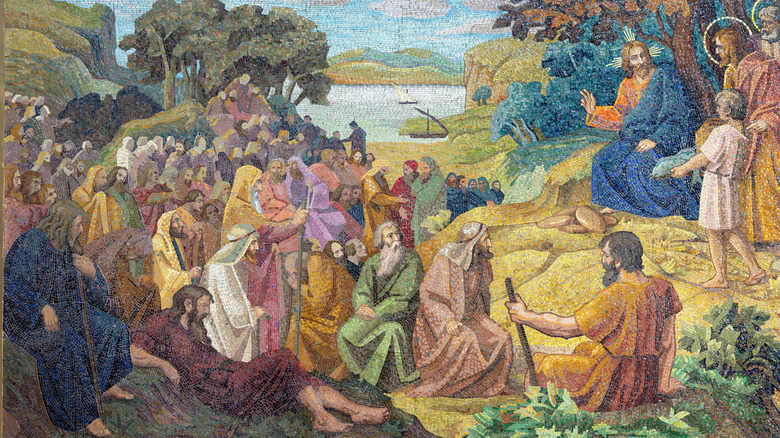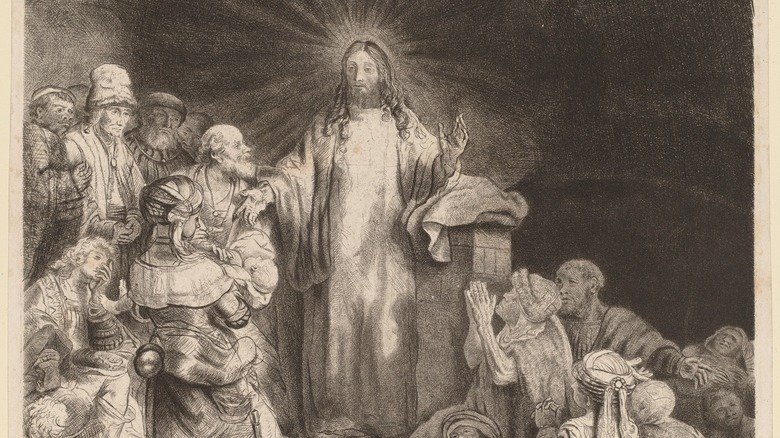This Is Where The Phrase Turn The Other Cheek Came From
Many of the sayings we use in English come from the Bible. For example, you may have been told not to "cast your pearls before swine" meaning to not offer something to someone who won't appreciate its value (Matthew 7:6), or you may have been warned about "the blind leading the blind" (Matthew 15:14). Another similar phrase also comes from the mouth of Jesus: "turn the other cheek." That's actually a summary of a longer sentence. What Jesus actually said is, "If someone slaps you on the right cheek, offer the other cheek also," or something roughly similar depending on the translation (Matthew 5).
On its face, the directive appears to contradict human nature completely. The normal human reaction to such violence would be to strike back or, at the very least, to try to protect one's self, rather than passively accept (or even invite) more violence. But is that what Jesus was actually suggesting? Today, 2,000 years after Jesus preached this directive, Christians still debate about what it means.
The phrase's context in the sermon on the mount
The sentence that gave us the English phrase "turn the other cheek" comes within the context of a much larger sermon that Jesus delivered. The "Sermon on the Mount," as it's called, consumes three whole chapters of the book of Matthew (Chapters 5-7), and in that sermon, Jesus delivers multiple points of wisdom, many of which may have seemed contradictory or downright shocking to the audience.
For example, as BBC News explains, one overarching theme contained within the Sermon on the Mount is the idea that God has higher expectations for his people than just what Old Testament law dictates. He mentions God's prohibition against murder and expands it to encourage his listeners to forgive one another. He mentions God's standards of divorce and explains that it's only allowable in the case of marital infidelity. He mentions the directive to love your neighbor, and expands it to explain that God's people must love their enemies as well, and even "pray for those who persecute you."
It's in this context — of Jesus expanding on existing law and teaching that God's expectations are higher — that the phrase "turn the other cheek" must be understood, says Christian question-and-answer website Got Questions.
It might not be an appeal to pacifism
The phrase "turn the other cheek," and the fuller sentence that inspired it, are not statements that mean Christians must embrace pacifism and steadfastly endure violence without fighting back or even trying to defend oneself, says Got Questions. Rather, it's about enduring insults, slights, and annoyances, says the writer. "Jesus' command to turn the other cheek is simply a command to forgo retaliation for personal offenses," they write, noting that this teaching still allows for judicial prosecution of crimes, for example, or for waging war, when necessary.
Similarly, women's counselor Dr. Alison Cook cites theologian N.T. Wright on her blog. Specifically, Wright notes that Jesus' mention of the right cheek is important here. "To be struck on the right cheek, in that world, almost certainly meant being hit with the back of the right hand. That's not just violence, but an insult; it implies that you're an inferior, perhaps a slave, a child, or a woman. Hitting back only keeps the evil in circulation. Offering the other cheek implies: Hit me again if you like, but now as an equal, not an inferior."
Or maybe it does encourage pacifism
The vast majority of the world's Christians appear to have taken the view that Jesus' injunction to "turn the other cheek" is not an appeal to pacifism. After all, most Christians are not opposed to their country waging a just war, or even signing up themselves to fight in that war. Similarly, most Christians will defend themselves (if they can) if someone invokes violence against them. Further, most will press criminal charges against someone who wrongs them, and indeed, many Christians are themselves a part of the law enforcement apparatus (police, prosecutors, judges).
However, a small minority of Christians do reject all of the above institutions. The most famous example, according to the University of North Carolina – Greensboro, are the Amish. They don't join the military, they don't invoke law enforcement when they're victimized, and some Amish will not even fight back when physically assaulted. Similarly, other Christians, while not necessarily Amish, have taken the pacifist view, based on the "turn the other cheek" principle and other dictates in Scripture, as David Hoekema writes in Religion Online.



